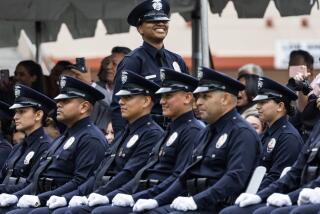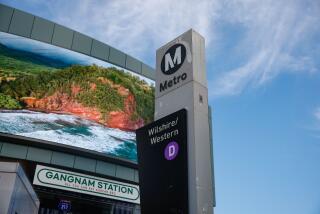MTA Set to Hire N.Y. Executive
- Share via
With Mayor Richard Riordan squarely behind him and the only other candidate a dropout Monday, a New York transit executive could be offered the Metropolitan Transportation Authority’s top job at today’s board meeting.
Michael C. Ascher will meet behind closed doors this morning with the MTA’s board, which has grown tired of the search for a new chief executive officer capable of turning around the nation’s most crowded bus system and the troubled Los Angeles subway construction project.
“If he acquits himself well” in the interview before the full board, “the odds are that he will be hired,” said County Supervisor and MTA board member Zev Yaroslavsky, who said that Ascher showed during an earlier interview that he has done his homework on the agency’s problems. “He knows what he’s getting into.”
Ascher, president of the Bridges and Tunnels Authority for New York City’s MTA, emerged as the likely choice after the only other candidate for the job, a retired Philadelphia transit official, dropped out of the running.
Ascher also enjoys the support of the MTA’s most influential director and its chairman, Riordan, and several other board members. Although Ascher was Riordan’s third choice--two other candidates turned down the job despite being offered more than $200,000 a year--a source familiar with the mayor’s thinking said he believes Ascher will be a top-notch CEO.
The source said that the more the mayor has gotten to know Ascher, the more he has become convinced “he is definitely the person we need.”
MTA board member James Cragin said Monday he is ready to vote to hire Ascher and expects a majority of the board members to follow suit. County Supervisor and MTA board member Yvonne Brathwaite Burke said she is favorably disposed toward Ascher. Larry Zarian, another board member, said he is leaning toward hiring Ascher providing he “stands by what he says, that he is independent and stays away from politics and counting votes.”
Board members are eager to fill the CEO job, which has been vacant since Joseph E. Drew resigned in December after less than a year on the job, saying that political infighting and “public hypercriticism” of him and his staff made his job impossible. The first MTA chief, Franklin E. White, served 32 months before he was fired in 1995.
Board members say the MTA needs a permanent leader now if the agency hopes to influence critical decisions affecting the agency in Washington and Sacramento.
The federal government has directed the MTA to try a third time to prepare a realistic plan for funding court-ordered bus improvements and its promised rail projects or risk losing federal transportation funds.
Ascher, a licensed engineer credited with helping rescue a massive New York subway rehabilitation project, is highly regarded for his skills in managing construction projects.
But a confidential report by the MTA board’s executive search firm said Ascher lacks experience in running a bus system. Los Angeles is under a court order to improve its bus system, which has more than 1 million boardings a day.
Several board members, however, said Ascher could hire experts in bus operations.
Ascher would become the point man for Riordan and other board members who want to shake up the top ranks of the agency.
“His first test is who he fires and how quickly he fires them,” said one MTA official.
Some MTA board members have expressed concern that Riordan might enjoy too much influence over Ascher. Those board members reminded the candidate in interviews that he would report to 13 bosses.
In his present $130,000 a year job, Ascher runs seven bridges and two tunnels serving more than 1 million commuters and oversees a budget of more than $200 million and a work force of about 1,500 employees. The MTA in Los Angeles has a $2.8-billion budget and more than 8,000 employees.
Ascher previously served as chief engineer of the New York City Transit Authority where, according to his resume, he oversaw a $6-billion subway rehabilitation project, “the largest single purpose public works transportation rehabilitation program ever undertaken in U.S. history.”
More to Read
Sign up for Essential California
The most important California stories and recommendations in your inbox every morning.
You may occasionally receive promotional content from the Los Angeles Times.











